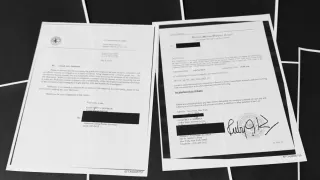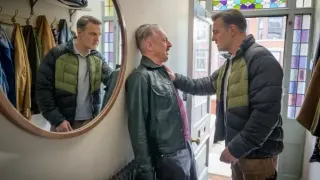February 22, 2024
Hometown Premiere: With 'Eurydice,' Matthew Aucoin Brings Acclaimed Opera to the Boston Lyric Opera
Kilian Melloy READ TIME: 9 MIN.
EDGE:: Before the Met production of "Eurydice" in 2021, you conducted the opera at the Los Angeles Opera in early 2020. Did you find that the reception to the Los Angeles production felt different to the reception at the Met 18 months later, when we'd been going through the pandemic?
Matthew Aucoin: It sure was different. In a way, the two productions were bookends. The LA production closed only a week or two before the world closed.
I got a lot of emails from people who saw the Met production, and had unexpected, intense forms of identification with the piece. I think a lot of people were feeling pretty raw, maybe having lost someone close to them or having endured a really difficult moment... and then, also, people who had had experiences with caring for people with dementia, caring for people who've lost their identity in some way. [I think] that the piece felt kind of close to the bone.
EDGE: You commented in an interview that your interpretation about Orpheus looking back was he had a perverse impulse in the back of his mind, thinking that such a loss would give him material for his songs; he is willing to sacrifice his happiness for his art. Maybe there's a flip side to that, in that Sarah Ruhl's text suggests maybe Eurydice isn't that keen to return to her life with Orpheus – she's just not that into him, as they say.
Matthew Aucoin: I think there are two love triangles in this opera. There's a kind of triangle between Eurydice, Orpheus, and Eurydice's father – not that she's in love with her father, but that she feels a pull towards him, which is also towards the realm of death. And then there's also a kind of love triangle between Orpheus, Eurydice, and music itself.
I decided to depict Orpheus as two singers, because I do think he has a split nature. He has this side to him that is that is somewhat superhuman, and I wanted to embody this supernatural side. Speaking of queerness, I wanted this spirit presence to have an androgynous quality, and also a homoerotic quality – a sense that Orpheus is a little bit narcissistic, he's kind of in love with this projection of himself as much as he is in love with his girlfriend.
I think Eurydice is an artist in Sarah's play. She's a thinker, she's a writer, and she seems every bit as neurotic as most artists are; she's full of self-doubt. She's constantly qualifying everything. There's this kind of, "I love you... I think" quality to her. She's not the first protagonist of a play to be undone by being indecisive.
EDGE: You're so accomplished at the age of 33, with a book, and operas, and being a conductor of orchestras.
Matthew Aucoin: A lot of things did happen more quickly than I expected, in the sense of having a lot of opportunities. But I have tried, and I think I'm succeeding, in really staying focused on just writing good music – which is not to say that I've written good music yet, but I think eventually I may write some good music. But what I need [in order] to do that is to ignore the external stuff and spend most of my days just sitting at home with a blank page.
This is a roundabout way of saying I'm trying, actually, to slow down, not speed things up, because I'm learning with every year that passes that these things take so long to incubate. [For] a piece the size of an opera, you just need so much silence. You need to spend so much time in silence to find something that feels true. So, the short way of saying this would be, hopefully, you ain't seen nothing yet! I'd better get started!
[Laughter]
EDGE: You've rearranged the music for the production coming up in Boston. How extensive are those changes going to be?
Matthew Aucoin: The original version of "Eurydice" is very large-scale. It has a very large orchestra and an off-stage chorus, which makes the piece difficult to produce by any except the very largest companies internationally. But the story, I think, is a pretty intimate one, so I always wanted to make a chamber-scale version of the piece that would be much easier for small and medium-sized companies to produce – as well as conservatories; I could imagine this version being produced by music schools. So, the piece is thoroughly re-orchestrated. The new version has an orchestra of 17 players, as opposed to more like 70 or 75 in the original. And there is no chorus. There are these three characters, the Stones, who are these obnoxious, bureaucratic Guardians of the Underworld, and in some of the moments where the chorus sings off stage in the original version, I've reassigned that music to the Stones so that they serve as a little chorus in the Greek sense. So, the piece is substantively the same, but the textures are all quite different because it's a much, much smaller ensemble.
The Boston Lyric Opera's production of "Eurydice," conducted by Matthew Aucoin, will run March 1 – 10 at the Huntington Theatre. For tickets and more information, follow this link.






